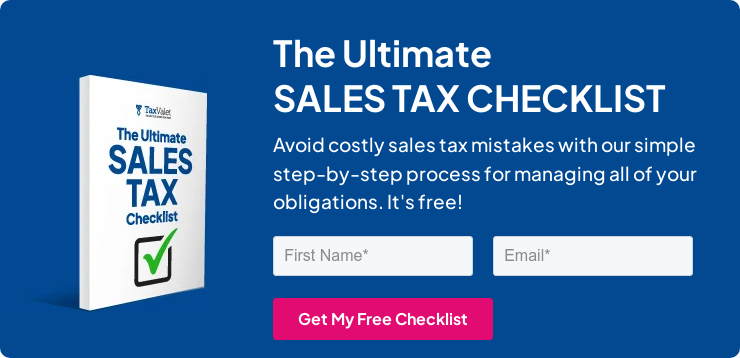Summary: In this post, we discuss what sales tax compliance is, why you need it, and how you can strengthen and protect your startup with a robust sales tax plan.
There’s no way around it: taxes are complicated and cumbersome — especially for startups doing business in the U.S.
Startups often don’t have in-house tax compliance expertise and have trouble finding a trusted advisor that understands their business , complicated tax laws and regulations. This is exactly why we offer tax compliance services – to help you avoid common pitfalls that can significantly disrupt your business, kill your cash flow, and leave you legally exposed.
In this article, we share:

- What is tax compliance
- Why it’s critical for the health of your startup
- How you can strengthen and protect your business
Sales Tax Compliance and Economic Nexus
Sales Tax compliance refers to a company paying their sales tax on time and in accordance with state and local tax laws and regulations.
The challenge for many startups is that tax laws vary state by state and many businesses don’t quite understand where they have a tax liability. As technology advances and business models evolve, tax laws and regulations have evolved, too, adding layers of complexity for startup founders and their executive teams.
In 2018, a Supreme Court case (South Dakota v. Wayfair), introduced the concept of economic nexus. With economic nexus, a company can be deemed to have a presence in a state if you sell goods or services there – even if you have no offices or operations there. This means your business could have a sales tax responsibility without having a physical presence in a state.
Examples of businesses economic nexus could apply to includes::
- Out-of-state sellers shipping products across state lines
- Multi-channel ecommerce sellers and and marketplace facilitator businesses similar to Amazon, eBay, or Etsy
- Software as a Service (SaaS) Companies
In many states, you will have economic nexus if you have made more than $100,000 in sales or 200 separate transactions in a 12-month period.
In other words:
Your startup may have a tax liability because you hit a certain transaction or dollar amount threshold in a state. But it’s important to note you can also have sales tax nexus without having any sales in a state, too!
The challenge is that not all states have economic nexus statutes and those that do have different definitions and thresholds. You can see a list of each state’s economic nexus thresholds from TaxValet by clicking here.
So how to navigate the murky waters of tax compliance? airCFO has partnered with TaxValet, a firm specializing in Sales Tax compliance for Startups. Their Founder, Alex Oxford, a sales tax consultant by trade, started TaxValet after working for an enterprise sales tax software company and understanding that solution wasn’t enough.
Strengthen and Protect Your Startup
At airCFO, we’ve partnered with TaxValet because of their clear step by step process to help our startup clients stay complaint and protected.
We’ve developed a clear five-step process to help our startup clients stay tax compliant and protected.
Here’s how it works:
1. We map out where you have sales tax nexus by state
Our first step is to map out a comprehensive profile of your business, team, operations, and revenue to confirm where you have sales tax nexus and to uncover potential exposure for tax compliance. Startups can have sales tax nexus for more reason than economic nexus (ie. physical presence). Nexus is just a legal term that means the state can enforce tax rules on you because you have sufficient presence in their state.
2. We determine the taxability of your products, services your historical sales tax exposure
Next, we review the established tax rules for tangible and intangible (e.g. software) property and services by state to determine where your products are subject to sales tax
As part of our due diligence process, we consider private letter rulings and state regulations specific to our clients and the business model for their products or services. Not all products and services are taxable in every state, and it is important to begin with as this can impact your overall exposure. Understanding exposure on a state-by-state basis is an important step that we include in our process.
Once we know how your products are taxed, we can determine which states pose the greatest risk to your business based on historical exposure, and help you come up with a plan to mitigate that risk.
Each sales tax plan we create is custom tailored based on what makes sense for your particular situation and risk tolerance.
3. We create a custom sales tax metrics for your startup
Our third step is to create a custom sales tax matrix for your business. This matrix maps out each of the definitions and tax administration practices by state along with a reference to its applicable law, rule, regulation, and written policy.
4. We create a bespoke tax compliance plan for your startup
Now that we’ve mapped out your economic nexus, determined the taxability of your product and services, and crafted your sales tax matrix, it’s time to put a plan in place to maximize your tax savings and keep you tax compliant.
This plan includes:
- Addressing any historical sales tax issues through compliance options such as voluntary disclosure to the IRS, thereby protecting you from inadvertent criminal charges for non-compliance
- Suggesting resources and tools, such as Avalara, TaxJar, and TaxValet, to streamline your operations to eradicate future tax compliance issues
- Registering with the states where your startup has nexus to begin collecting sales tax as required by law
- Filing periodic sales tax returns and remit payments accurately and on time
4. We maintain the plan and adjust as needed
Sales tax laws will continue to evolve. Once your plan is in place, we routinely track legislation changes and your nexus profile to ensure compliance so you can remain legally in the clear, giving you peace of mind and protecting company cash flow. Sales Tax compliance for startups is a pain point common amongst every founder it applies to. airCFO and TaxValet are excited to team up together in order to alleviate the stress and provide this service to founders!
Need help? We’ve got you covered.
We work with founders and management teams to streamline systems, provide financial clarity, build awareness around sales tax compliance for startups, and improve financial literacy, giving you peace of mind without the hefty back-office investment.
Written in collaboration by Alex Oxford, TaxValet, CEO and Justin McLoughlin, airCFO, CEO
Alex is a sales tax author, speaker, and consultant. He founded TaxValet after working for an enterprise sales tax software company and realized that software “wasn’t enough” to solve the problem of sales tax for good.

Get in Touch
Company
Disclaimer: Nothing on this page should be considered tax or legal advice. Information provided on this page is general in nature and is provided without warranty.
Copyright TaxValet 2023 | Privacy Policy | Site Map

Disclaimer: Our attorney wanted you to know that no financial, tax, legal advice or opinion is given through this post. All information provided is general in nature and may not apply to your specific situation and is intended for informational and educational purposes only. Information is provided “as is” and without warranty.
What you should do now
- Get a Free Sales Tax Plan and see how Tax Valet can help solve your sales tax challenges.
- Read more articles in our blog.
- If you know someone who’d enjoy this article, share it with them via Facebook, Twitter, LinkedIn, or email.




